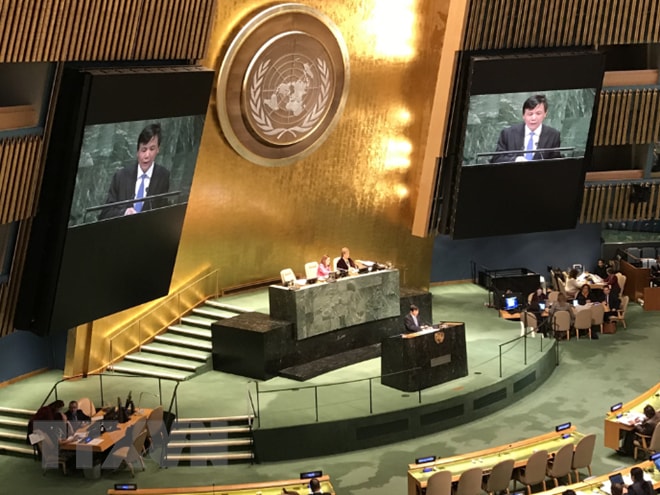The international community calls on the US to immediately lift the embargo on Cuba.
Ambassador Dang Dinh Quy affirmed that Vietnam will vote in favor of Cuba's draft resolution and wishes to join the international community in calling on the US to immediately lift the embargo on Cuba.
On October 31 and November 1, the 73rd Session of the United Nations General Assembly, chaired by the President of the General Assembly - Ms. María Fernanda Espinosa Garcés, held a plenary session, discussed and voted to approve draft resolution No. A/73/L.3 on "The need to lift the US economic, commercial and financial embargo against Cuba".
Speaking at the General Discussion, on behalf of Vietnam, Ambassador Dang Dinh Quy, Head of the Vietnamese Mission to the United Nations, emphasized that the positive signals in the US-Cuba relationship a few years ago are gradually disappearing as the embargo and sanctions have been re-enforced and increased by the Trump administration since April 2017; affirming that this US policy is a step backward and increases tensions in the relationship between the two countries.
Ambassador Dang Dinh Quy affirmed Vietnam's consistent stance of opposing the imposition of embargoes and unilateral pressure by any country; affirmed that Vietnam will vote in favor of Cuba's draft resolution and wishes to join the international community in calling on the US to immediately lift the embargo policy, creating conditions for Cuba to fully exploit its development potential, integrate into the world economy and trade in a fair and equal manner, build the country freely, and meet the common aspirations of the international community as well as the people of the two countries.
China's ambassador to the United Nations said that China opposes any embargo or sanctions by one country against another through military, economic, diplomatic or any other means. China calls on the US to immediately lift the embargo on Cuba; hopes that the two sides will continue to seek opportunities for dialogue to resolve differences in the future.
Representatives of seven regional groups and more than 40 countries all affirmed their support for the resolution, calling on the US to soon lift the embargo and blockade against Cuba, acknowledging the positive changes in Cuba policy of the administration of former President Barack Obama while expressing concern about the dangerous consequences of the policy of reinforcing and strengthening the embargo against Cuba by the administration of President Donald Trump.
Representatives of the African Group, the Community of Latin American and Caribbean States (CELAC) and the Community of Caribbean States (CARICOM) shared the view that the US embargo has created core obstacles and difficulties for Cuba's development, violating international law and the United Nations Charter.
Egypt - Representative of G77 + China, condemned the US's increased embargo on Cuba as going against the wishes of the international community; called on the international community to increase efforts to influence and encourage the US to lift the embargo on Cuba.
Venezuela, on behalf of the Non-Aligned Movement (NAM) countries, strongly opposes the unilateral use of economic sanctions to pressure other countries, especially developing countries; believes that the US embargo is a factor that hinders the peaceful development in the region in general and Cuba in particular; calls on countries to strongly oppose the US's additional proposals, arguing that these proposals are inconsistent with the content and purpose of the draft resolution proposed by Cuba.
Bangladesh, on behalf of the Organization of Islamic Cooperation (OIC), said the US embargo is hindering the implementation of Cuba's sustainable development goals, harming the interests of the two peoples and relations between the two sides.
Singapore, representing ASEAN, emphasized the principles in international relations such as respect for independence, sovereignty, non-interference in each other's internal affairs, respect for international law and the United Nations Charter; affirmed ASEAN's support over the past 17 years for the resolution against the embargo on Cuba; and emphasized the need to protect multilateralism mechanisms against unilateral acts of oppression by major powers.
Austria, on behalf of the European Union (EU), assessed that the US embargo is causing great damage to both Cuba and the EU; called on the US to open dialogue and cooperation with Cuba... The EU does not support the US's additional proposal because it is "inappropriate in content and agenda," emphasizing that all EU countries will vote in favor of the draft resolution proposed by Cuba.
Meanwhile, Ambassador Nikki Haley, Head of the US Mission to the United Nations, said that in the past 27 years, the US has only changed its vote once, but this year the US continues to pursue its previously set goal of protecting the US embargo against Cuba, even though the US is isolated.
Earlier, the United Nations General Assembly passed a resolution with an overwhelming consensus, 189 out of 193 votes in favor, calling on the US to end the decades-old embargo against Cuba. The US and Israel voted against, while Ukraine and Moldova abstained. The 193-member organization also rejected the US criticism of Cuba's human rights violations.
This is the 27th consecutive time the United Nations General Assembly has passed a resolution calling for the lifting of the US embargo imposed on Cuba since 1962. However, this resolution is not binding./.


